Tuesday Feb 17, 2026
Tuesday Feb 17, 2026
Friday, 18 December 2020 00:00 - - {{hitsCtrl.values.hits}}
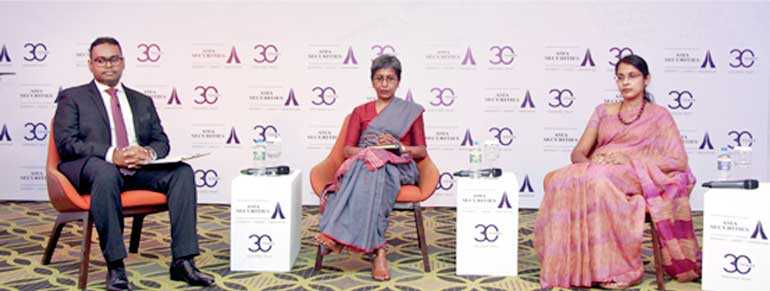
From left: Asia Securities Senior Vice President – Research Kavinda Perera, Institute of Policy Studies of Sri Lanka Executive Director Dr. Dushni Weerakoon and University of Sri Jayewardenepura Department of Immunology and Molecular Medicine Professor Prof. Neelika Malavige
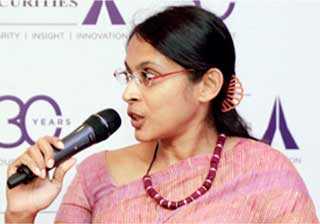 |
| University of Sri Jayewardenepura Department of Immunology and Molecular Medicine Professor Prof. Neelika Malavige |
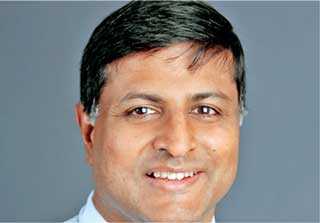 |
| Institute for Health Policy Executive Director Dr. Ravindra P. Rannan-Eliya |
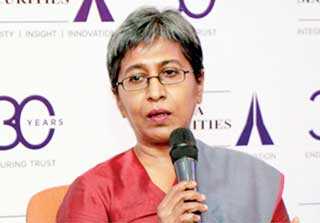 |
| Institute of Policy Studies of Sri Lanka Executive Director Dr. Dushni Weerakoon |
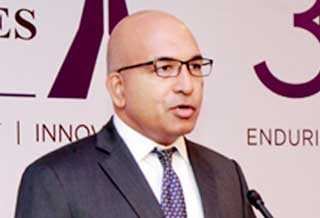 |
| Asia Securities Chairman Dumith Fernando
|
The fight against COVID-19 has been widely framed as a trade-off between managing the ongoing
public health crisis and salvaging the economy. Both public health and economic thought leaders now indicate that this a false dichotomy.
Speaking at the 4th Annual Asia Securities Sri Lanka Investment Conference, an expert panel comprising Prof. Neelika Malavige, University of Sri Jayewardenepura; Dr. Ravindra P. Rannan-Eliya, Institute for Health Policy; and Dr. Dushni Weerakoon, Institute of Policy Studies of Sri Lanka, agreed that that any lasting economic recovery will depend on resolving the COVID-19 health crisis.
The virtual conference titled ‘2021: The Investors’ Dilemma’ hosted by Asia Securities, Sri Lanka’s leading independent investment banking and wealth management firm, kicked off yesterday and garnered strong interest from the investor community.
While news of the vaccine breakthrough is cause for optimism, it is vital to remember that testing and contact tracing will remain key to COVID containment. Speaking at the Asia Securities Sri Lanka Investment Conference, Dr. Ravindra P. Rannan-Eliya stressed that expanding PCR testing capacity and contact tracing is more effective in combating the pandemic than a vaccine.
He highlighted that, “Data shows countries that have successfully eradicated COVID-19 outbreaks and brought them under control, are those that have aggressively increased PCR testing capacity. A vaccine, on the other hand, wouldn’t be as effective, because dosage volumes, especially for countries like Sri Lanka, would not be sufficient to achieve adequate herd immunity.”
Dr. Rannan-Eliya also pointed out that when we speak of the efficacy of the current vaccines, this only refers to the prevention of symptoms and death in people, so it does not refer to prevention of transmission. This is not enough to curb the pandemic within the next one to two years so second-generation vaccines are essential. Commenting on the Ministry of Tourism’s decision to open the airports, he argued that it is vital for Sri Lanka keep borders closed for the time being to protect businesses.
When asked about the timeline of the vaccine coming into the country Prof. Neelika Malavige stated: “The ‘COVAX Program’ will cover 20% of the population and is expected to come in August/September 2021. The country will first receive 10% of the vaccines and remainder will arrive the following year. However, given the limited quantities of the vaccine, stopping transmission may not be possible.”
Prof. Malavige who has been involved in various international COVID management initiatives including vaccine development work, also noted that the Government is looking at purchasing vaccines outside the WHO’s COVAX Program, directly from the manufacturer. She stated that the Government is also exploring the possibility of getting the private sector more involved through management and vaccines (at regulated prices).
Elaborating on the Government’s intention to expand the mass testing programme, Prof. Malavige stated that, “Testing capacity, which is currently operating at 14,000 tests per day, is expected to reach 40,000-50,000 tests per day in approximately a month.”
Speaking at the conference, Dr. Dushni Weerakoon noted that while the Government has a medium-term policy framework in place, it now needs to look towards bridging the financing gaps created by high levels of public debt and widening fiscal deficits. She stressed that definitive plans are vital to boost investor confidence and maintain macroeconomic stability.
Dr. Weerakoon further noted that economic recovery will hinge on stronger income and consumption growth, stating: “The initial impact to the economy from COVID-19 was a supply side shock. Now what we see is a demand side shock. People are not spending due to concern on livelihoods. To drive economic growth in the next year will require people going back into employment. However, the health risks are high, especially given that almost 68% of the labour market is from the informal sector. There will have to be a strong public health message that goes out to those workers to give them a sense of confidence that going back to work is not putting their lives at risk.”
Commenting on the importance of understanding the ‘medical problem’ at hand for Sri Lankan investors, Asia Securities Chairman Dumith Fernando, said, “In the current context, it's quite important for us to not only understand what the next year would be like, but also dig deep into the continuing effects of what happened in 2020. The outline of the conference is going to be around the remnants of the turbulence that occurred in 2020, particularly related to the pandemic and understanding the root causes that would assist a recovery. Without really understanding the issues and the path to recovery of the 'medical problem' it would be hard to understand the economic impact and the investment challenges going into 2021.”
Asia Securities is a leading investment firm in Sri Lanka providing investment banking, research, equities, and wealth management services to local and international corporate, institutional, and individual clients. Hosted by the firm’s award-winning Research team, the Annual Sri Lanka Investment Conference series is an integral part of Asia Securities’ calendar that focuses on in-depth discussions with veterans in industry and policymaking and has garnered significant investor interest in the last few years.